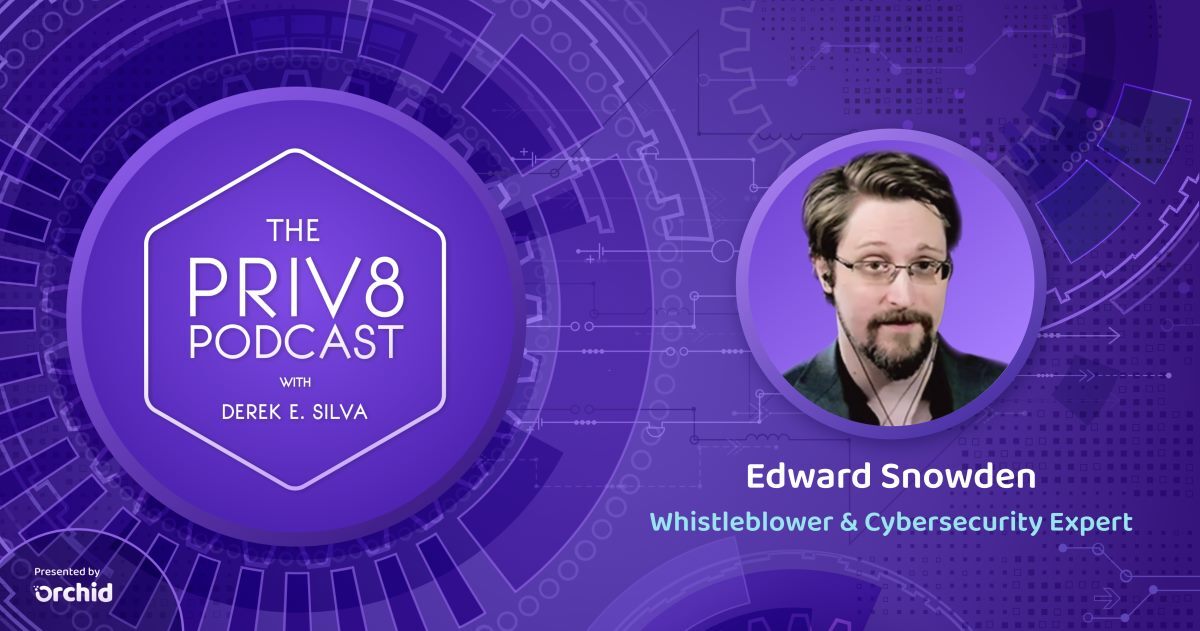
Edward Snowden joins Priv8 to discuss causes and solutions for a broken Internet
May 6, 2021
So said Edward Snowden, speaking at the Priv8 Virtual Summit, a first-of-its kind event focusing on digital privacy. Snowden spoke with Electronic Frontier Foundation Director Cindy Cohn and Orchid CEO Dr. Steven Waterhouse (Seven), on the Internet's current problems, which he says are a symptom of something that goes much deeper.
"When I was younger, the Internet was an expression of the aggregate of individual desires of small communities," said Snowden. "There weren't a lot of commercial interests in the earliest expressions of the Internet." But over time, he "saw the replacement of a creative and cooperative network with something that was commercial and competitive ... a system that is fundamentally unfair."
As power becomes increasingly centralized, resentment is "blossoming"
Snowden explained that he sees a pattern in the centralization of power across society. "Look at the economy," Snowden said. "There is an increasing concentration of resources into fewer and fewer hands." Trends toward the centralization of power and resources can be observed across society, he said. Political power has followed a similar pattern; reflected online, this phenomenon has put more hands in the power of large tech platforms.
As inequity has continued to grow on and offline, Snowden said, bitterness has bloomed: "As our economy, politics, and culture have sought in this modern moment to reduce access to an equal role in our common franchise, resentment and grievance have blossomed to become an 'instrument of war.'"
The "talent show" that runs modern life
If resentment is the weapon, who is at war?
"Institutions are competing against the individual, while the individual is competing against itself," Snowden explained. "This is by design: competition is everywhere, but only amongst the powerless." What does this competition look like? By way of example, Snowden explained that every day, social media users are "performing" in a "talent show."
"You're going to [post] from a device that you paid for -- but you don't truly own -- using apps that answer to just about anyone who is not you. And for what? For the likes. Everything is for the likes ... in pursuit of that brief, shining moment when we can leave this decaying hellscape behind and be elevated to the attention of the crowd."
"Meanwhile," he continued, "There is no competition at all amongst those who rent out the stage on which the little dramas that represent our lives are played out on. From ad space to electricity to bandwidth to rent, we pay, and we pay, and we pay."
Why do we need privacy?
The consequences of this are catastrophic, says Snowden. "We have been -- as individuals and as a society -- atomized, fragmented, spread thin, and really harried by a thousand demands and needs and requests for attention and decision," Snowden said.
As our attention is spread thin, our time, money, and human rights dwindle away -- including the right to privacy. Why is that important? "What is the purpose of privacy, and why is its loss on the Internet so damaging?" Snowden answered his own question: "Privacy is what protects the right of inquiry that leads to progress. Privacy is the right to the self. It allows you to be different and distinct from the majority."
"It is the differences amongst us that provide the seeds of progress ... when you have a difference--when you think differently, when you see differently, when you speak differently, when you feel differently, when you just want to try something and see how it works out -- if that is dangerous to you, you are disincentivized to try it."
Through these disincentives, "society has lost something meaningful," he said, "because [the expression of difference is] the only way to break from the orthodoxies of history."
How can people gain back their power?
"It doesn't matter if you're on the left, or the right, or the center -- most people probably agree that things don't look that great right now," Snowden said. "What should our answer be? How do we confront the challenges of a quantified world where the individual is electronically naked to the point where they might as well be physically naked?"
"We are transparent before power; they are opaque to us," he said. "We need to recognize that everything that we do interacts with systems that are larger than us. They will be co-opted, and they will be used by [the controllers] of these systems for their own intentions."
Indeed, "we are building architectures of oppression," Snowden said. "But what we need to do is look at these structures and think about how they can be used for the betterment of people."
Snowden specifically pointed to the crypto space as "one of the most encouraging" areas of progress and promise. "Everyone who's building on these different chains understands the value of decentralization. If centralized platforms fall out of favor for a decentralized authority ... all of the privileges that the modern world invests into centralized authorities will begin to evaporate."
You can hear Edward Snowden's full talk on how to fix the broken Internet here. And be sure to follow the Priv8 podcast on your favorite streaming service.
If you enjoyed this blog, subscribe here for privacy news, commentary, and product updates from Orchid.



